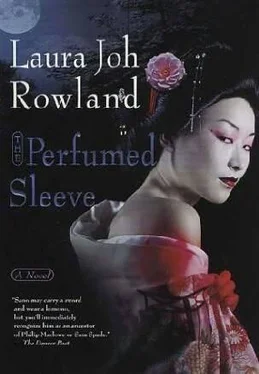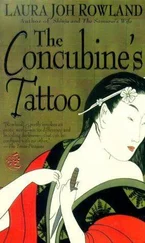He said, “I can’t just take you to Makino’s estate and order his people to hire you as a maid. They would guess why I wanted you there, if not who you are.”
Reiko smiled. The fact that Sano was raising practical concerns meant he’d decided in favor of her plan. Apprehension filled her because the prospect of leaving home, in search of a killer, was now a terrifying reality.
“We’ll think of a way around the problem,” she said.
“I can’t send you into that estate by yourself,” Sano hedged.
“There are ways around that, too.”
Sano remained silent for a long, suspenseful moment. At last he nodded. Feeling as much doomed as victorious, Reiko put her arms around Sano; he held her close.
“I’ll go tomorrow,” Reiko said. “I promise I’ll discover things that will make you glad you agreed.”
“I promise that no harm will come to you,” Sano said.
With her face pressed against his chest, neither could see the other’s expression.
The morning of Senior Elder Makino’s funeral dawned clear, bright, and cold. Through the Edo Castle official district moved the procession led by black-clad samurai bearing white lanterns on poles. Wind ruffled the gold paper lotuses carried by more samurai. Priests followed, tinkling bells, beating drums, scattering rose petals on the ground, waving incense burners whose drifting smoke scented the wintry air. Tamura rode on horseback, carrying the funeral tablet, ahead of Makino’s coffin. More priests, chanting sutras, preceded three palanquins that transported Makino’s wife, concubine, and actor.
Sano stood outside his gate with Hirata and some of his detectives. They held the reins of their horses as they watched the procession pass, destined for the riverside cremation ground. Hirata said, “I see that Okitsu has recovered.”
He sounded glad that his interrogation had done her no permanent harm. Sano nodded, preoccupied with worries that stemmed from the plans that he and Reiko had devised last night.
Last in the funeral procession came the household attendants, the men wearing black, the women in white. A few samurai officials trailed them.
“Not much of a crowd to escort Makino on his last journey,” said Detective Marume.
“Everybody’s afraid to leave the castle,” said Detective Fukida. “They don’t want to miss any political developments.”
In the wake of the procession arrived another, which consisted of mounted samurai-Ibe and Otani, each accompanied by a team of comrades to help him observe Sano at work.
“What is the plan for today?” Ibe asked Sano.
“We’re going to look into the histories of the suspects from Senior Elder Makino’s house,” Sano said. “I’ll take the chief retainer and the actor. Hirata will take the wife and the concubine.”
Hirata flashed a glance that thanked Sano for giving him an opportunity to make up for yesterday’s fiasco, but Ibe and Otani burst into protests. “We should be hunting for more evidence against Lord Matsudaira’s nephew Daiemon instead of those other people,” Ibe said.
“I say we should look for more clues that Chamberlain Yanagisawa is the murderer,” Otani hastened to object.
Sano lost all patience with his watchdogs. He was regretting that he’d let Reiko convince him to let her spy on Makino’s household. Tense and edgy, he couldn’t tolerate any more trouble from Otani or Ibe.
“We’ll do as I say,” Sano curtly told them.
He didn’t mention that he would investigate Chamberlain Yanagisawa and Daiemon when necessary. He also forbore to tell them of Reiko’s plan. Only Hirata and a few of his most trusted detectives knew he’d called in a favor and arranged her employment at Makino’s estate.
Now he said to Otani and Ibe, “If you want to see anything to report to your masters, come with us.”
He and five detectives mounted their horses and started up the street. Hirata and the other five rode in the opposite direction. Otani and Ibe exchanged indignant glances. Then Ibe sent half his men to follow Hirata, while he and the others hurried to catch up with Sano. Otani also divided his party, then he chased after Hirata.
“Where are we going?” Ibe asked Sano as they and their men cleared a checkpoint in the winding, walled passage between the official district and the palace.
“To metsuke headquarters,” Sano said.
The metsuke was the Tokugawa intelligence service that guarded the regime’s power over Japan. Its agents collated and interpreted information gathered by a widespread network of spies and informers. Sano now hoped to tap the metsuke’s treasure trove of facts about citizens.
He and his entourage left their horses outside the palace compound. They walked through the palace’s labyrinth of corridors, government offices, and reception rooms to a chamber divided by paper-and-wood screens. Here, men rushed back and forth between desks that overflowed with scrolls, message containers, and writing implements. They smoked tobacco pipes while they pored together over maps hung on the walls; they conversed in urgent mutters. Sano observed that the political unrest had the metsuke agents working hard to keep abreast of developments and anxious about their own fate.
As he hesitated near the door, the agents noticed him and his fellow intruders. Talk gradually ceased. Sano scanned the faces turned toward him but didn’t find the one he sought.
“I’m looking for Toda Ikkyu,” he finally announced.
A samurai dressed in gray stepped out from a group of agents. He bowed to Sano. “Greetings, Sōsakan-sama.”
Sano returned the bow. “Greetings, Toda-san.”
Toda, a senior intelligence agent, had such an indistinct appearance that Sano always forgot what he looked like, even after consulting him often during past investigations. He was neither short nor tall, fat nor thin, old nor young. He had a face that no one would remember-an advantage in his profession.
“Let me guess,” Toda said. “You’ve come to get my help in investigating Senior Elder Makino’s murder.” Now his world-weary voice and manner jibed with Sano’s vague memory. Toda’s gaze took in the men ranged behind Sano. “And you’ve brought the observers assigned to you by Chamberlain Yanagisawa and Lord Matsudaira.”
As usual, he demonstrated his knowledge about what went on in the bakufu. He moved partitions, enlarging the space around his desk. “Please make yourselves comfortable,” he said.
“Thank you,” Sano said.
He and his detectives knelt on the floor; Ibe and his men, and Lord Matsudaira’s, crowded around them. Sano knew that despite the ready welcome, Toda wasn’t eager to part with information: The metsuke jealously hoarded knowledge, the basis of its unique power. But Toda dared not refuse to help apprehend the killer of the shogun’s friend and high official.
“I have Makino’s dossier right here.” Toda sat behind his desk and placed his hands atop a ledger. “Which of your murder suspects among his associates do you wish me to tell you about?”
“Start with Makino’s wife and concubine,” Sano said.
Toda paged through the ledger. “I’ve nothing listed on them except the dates that Makino married Agemaki and brought Okitsu into his house. There was no reason to think they merited our attention, until now.
Sano reflected that the entire bakufu considered most women too unimportant to notice. Reiko had proved more helpful in this instance. “What about the actor?”
“Here he is,” Toda said, pointing to a column of text. “Born Yuichi, son of a teahouse owner, twenty-five years ago. Present stage name Koheiji; employed at the Nakamura-za Theater; specializes in samurai roles. Formerly known as Kozakura and employed at the Owari Theater. There’s no record that he’s ever been in any trouble. He was considered harmless company for Senior Elder Makino.”
Читать дальше












